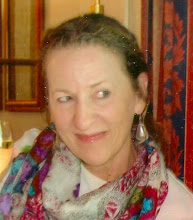Dearest Friends,
The place that was to become our new home, Bahrain, may have been another island that was part of an archipelago, just as Java had been, but that's where any similarity ended. Thanks to its centrality to trade routes, and the pearl-rich waters that surrounded it, it had a long history of being fought over, ruled, and influenced by others, including the Sumerians, Assyrians, Babylonians, Persians, Portuguese, Arabs and British. The following excerpt from Wikipedia, about the period when Bahrain became a British protectorate, explains a lot about the mix of people that are there today:
"Peace and trade brought a new prosperity. Bahrain was no longer dependent upon pearling, and by the mid-19th century, it became the pre-eminent trading centre in the Persian Gulf, overtaking rivals Basra, Kuwait, and finally in the 1870s, Muscat.[35] At the same time, Bahrain's socio-economic development began to diverge from the rest of the Persian Gulf: it transformed itself from a tribal trading centre in to a modern state.[36] This process was spurred by the attraction of large numbers of Persian, Huwala, and Indian merchant families who set up businesses on the island, making it the nexus of a vast web of trade routes across the Persian Gulf, Persia and the Indian sub-continent. A contemporary account of Manama in 1862 found:
| “ | Mixed with the indigenous population [of Manamah] are numerous strangers and settlers, some of whom have been established here for many generations back, attracted from other lands by the profits of either commerce or the pearl fishery, and still retaining more or less the physiognomy and garb of their native countries. Thus the gay-coloured dress of the southern Persian, the saffron-stained vest of Oman, the white robe of Nejed, and the striped gown of Bagdad, are often to be seen mingling with the light garments of Bahreyn, its blue and red turban, its white silk-fringed cloth worn Banian fashion round the waist, and its frock-like overall; while a small but unmistakable colony of Indians, merchants by profession, and mainly from Guzerat, Cutch, and their vicinity, keep up here all their peculiarities of costume and manner, and live among the motley crowd, ‘among them, but not of them’. WG Palgrave, Narrative of a Year's Journey through Central and Eastern Arabia (1862-3)[37] (Inserted by Miss Becky: For some reason, this description reminds me of the bar scene in Star Wars!) | ” |
(The one thing I would not find in any of the coffee houses when we got there, was women -- Bahrain was most definitely a "Man's World"!)
The great trading families that emerged during this period have been compared to the Borgias and Medicis[40] and their great wealth - long before the oil wealth for which the region would later be renowned - gave them extensive power."
Just as the pearl industry took a huge hit from Japan's cultured pearl industry, Bahrain became the first country in the Gulf area to drill for oil. They didn't become an independent country until 1971, when the British decided to end all treaty relationships in the Persian Gulf. By the time we arrived, in '76, the U.S. Navy had moved onto the base formerly occupied by the British, and civil war had broken out in Lebanon. So, just as their own oil supplies were becoming depleted, Bahrain was able to step in and replace Beirut as the banking center at the heart of the booming Persian Gulf. However, though everyone claimed it to be "the Hot Spot of the Middle East", that is not really how it appeared to us when we first arrived. To us it just looked, well, hot!




















No comments:
Post a Comment